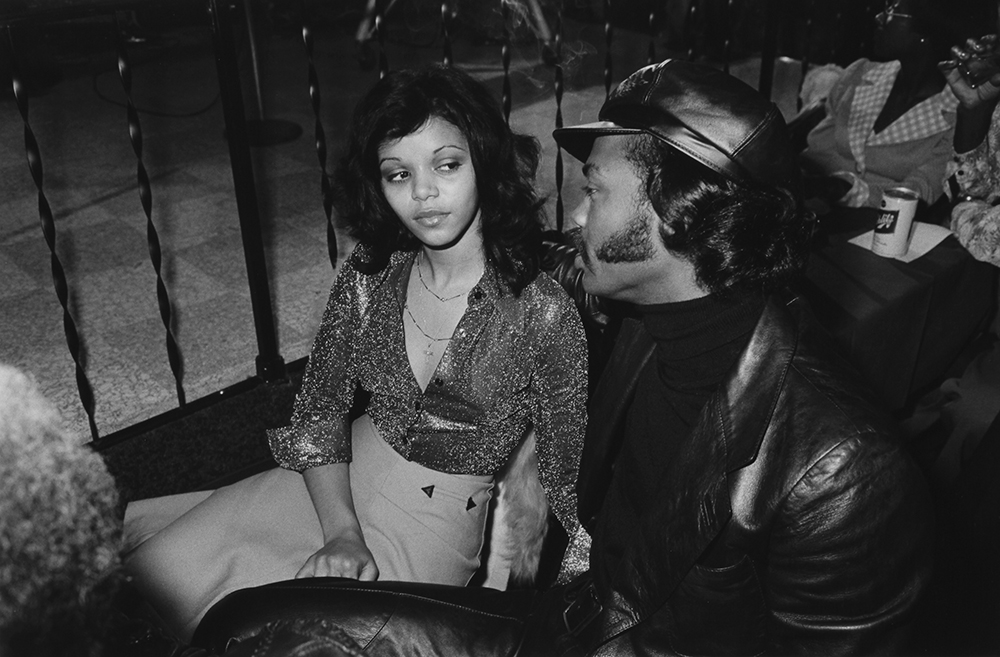F Newsmagazine Speaks With Ana Lily Amirpour, Director of A Girl Walks Home Alone at Night
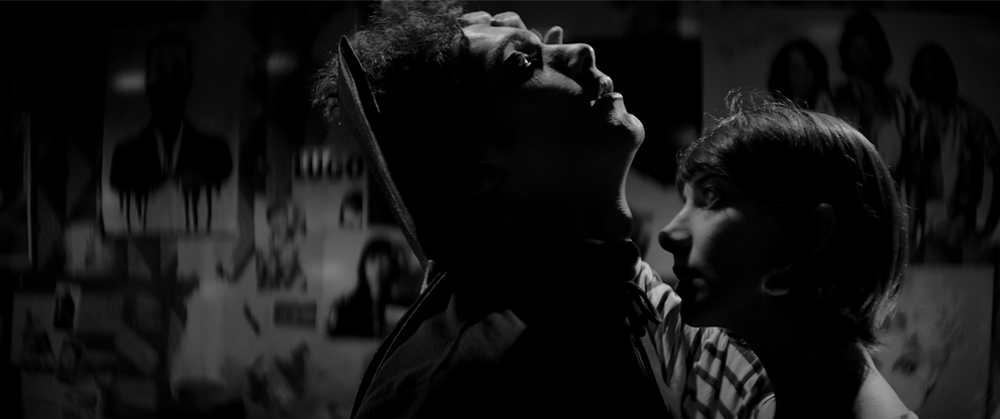
An excerpt from this exclusive interview was published in the December 2014 issue of F Newsmagazine
Film director and writer Ana Lily Amirpour sat down with F Newsmagazine to talk about her first feature film, her love of Las Vegas, her creative process, and her experience as an art student. Here she offers inspiring, colorful metaphors for advice on harnessing one’s own creative processes… and also proves that she’s just about the coolest person ever.
Both critics and audiences have praised Amirpour’s debut feature A Girl Walks Home Alone at Night, which she wrote and directed. The film moves through “Bad City,” an isolated world of quiet chaos and (mostly) bad people. Amirpour references spaghetti Westerns, David Lynch, Sergio Leone, Quentin Tarantino and classic horror and gore to assert her own unique artistic vision on the vampire genre. The film’s crisp black-and-white images immediately signal that it will extend beyond the standard vampire fare, which it does on many levels. Because Amirpour exploits film’s power to create atmosphere and feeling so successfully, it has been called “a film about film.”
Amirpour wrote over one hundred years of backstory for her main character, the Girl, and has turned it into a graphic novel series. In a press release, she states that the film is “just a fraction of time in her existence.”
A Girl Walks Home Alone at Night will have a two week screening at The Gene Siskel Film Center in downtown Chicago beginning January 2, 2015. To learn more about the film and find showtimes, visit this website.
Allison O’Flinn: I hear you have an interesting tradition before writing a screenplay, and that it involves going to Las Vegas.
Ana Lily Amirpour: Yes. Well, I go there at different times during the writing process. I drive to Vegas and lock myself in a hotel room for about five days. I spend almost my entire time in the room like a lab rat. Normally I don’t leave the room for the first 48 hours and try to comb through a script. Then, if I feel happy with myself, I will reward myself with a steak and a martini at the video poker bar.
Is it just you alone? Or are there others who join you?
It’s just me alone. Well, I have Vegas all around me. I find Las Vegas very peaceful and calming when I go alone. I understand it. It’s crazy and hectic in a post-apocalyptic way. It’s like being in the eye of a hurricane. People ask me, “How can you focus in Vegas? It’s too crazy! Why don’t you just go to Big Bear and rent a cabin in the woods?” I’m like, “Dude, I don’t want to rent a fucking cabin in the woods.” That’s like a nightmare to me. I would just sit there and freak out that bears were going to kill me.
In Vegas, you’re kind of in this strange stew of human beings and it’s always interesting. I like to go down to the horse racing ring, where there are these long aisles of desks, where elderly men sit and watch the horse races. There are all these individual TVs, and it’s super sci-fi and peaceful in a weird way. If I need a place to re-read my scripts I will sit there with headphones.
I love Vegas, man. I understand it. Because in general, on the scale of nature to unnatural it would go from nature on one side and Vegas on the other. I feel completely unnatural in nature. Whenever I’m in nature, like on a hike, or camping or whatever, it’s not that I don’t think it’s pretty. I do, it’s nature; it’s like fucking 2001 Space Odyssey alien awesome shit. I’m always hyper aware of the fact that I do not belong there and could not exist there. Bears and squirrels belong there. I need shit wherever I am, and Vegas is the extreme of having whatever you want. To me, nature feels very unnatural and Vegas feels much more natural. Vegas is really our nature. People just need to stop lying to themselves. You know if you break your leg up there in the woods, you’re fucking done for. And even if you didn’t break your leg, even if you just got lost, how long are you going to last? We built all these roads and cars and houses because that makes more sense. So, yeah I love Vegas.
I love to work in a city like New York, where there’s things going on around me, and if you need a break you can take it and absorb the energy around you. It seems like Vegas is like that, times ten, because of all the reasons that you said; it’s super synthetic, gaudy and busy.
Yeah! Gaudy and busy. New York is interesting because I’ve actually never been able to focus at all in any way in New York City even though there is a similar energy to Vegas. In Vegas I can work because of the room, because there you can get a nice room at the Encore, and you have a giant window. You really are like a lab rat, like a hamster in a little container. In New York, all the inside places are so awful. I can’t stay in them. I feel immediately claustrophobic. There must be another version of New York for the extremely well-to-do that’s really awesome, but I can never be inside in New York. People live like animals! It’s crazy rough. I’m like “Wow, really? OK. Where do you put your stuff?”
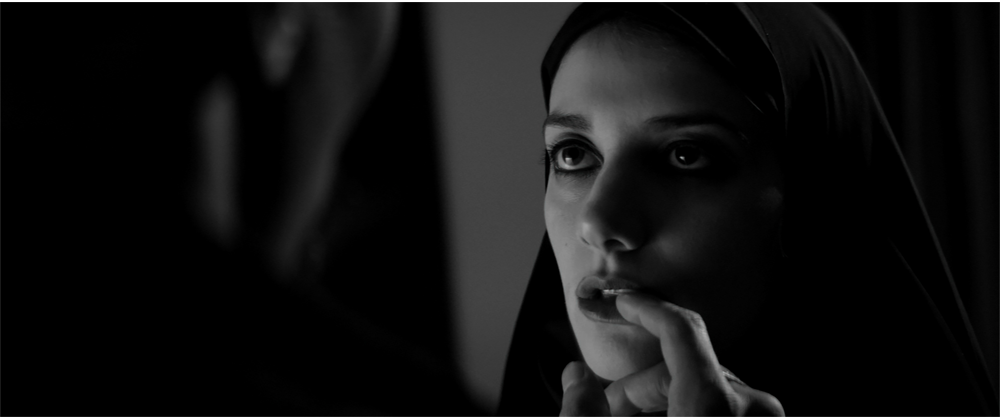
When you’re writing a screenplay, what’s your day-to day-routine? Do you write all night? How do you attack it?
When I wrote my first script eight years ago in November, I was living in San Francisco attending art school. I studied painting and sculpting, and that’s where I got my bachelor’s degree. I was in a band, but I was always making films and writing all along the way. I wrote some short stories, and then some guy wanted to auction off my story. That was when I figured out that people write screenplays, and I started doing that. After a Halloween that was extremely debaucherous, I decided the next day, on November 1st, that I was not going to drink for a month. In that month, eight years ago, I wrote my first screenplay. Then, I did a second screenplay the next November, and that one got me into all the film schools and won some screenwriting prizes.
I don’t think that I have a set writing process. It changes and evolves. When I was in the screenwriting program at UCLA, you have fourteen weeks to create a first draft. The time pressure pushes it out, which is nice, because it got me to write some bad scripts, which helps you know what’s bad.
For A Girl, I had scenes in mind that I wanted to create. I thought, “This guy is going to be dressed up like Dracula, high on ecstasy, and he’s going to meet the girl.” So I had to make that happen. I wanted that moment to be in the film and then I figured it all out – how everything could get to that point. I think that with any movie it’s the really tense moments that you remember. I don’t normally put too much focus on plot. Like, if you think of Pretty Woman, you’re going to immediately think of particular scenes: you think of when he picks her up on the street, when she goes shopping. You know those moments; you don’t summarize the plot like, “Yeah a guy picks up a sex worker and they fall in love” because it’s not really that complicated. So I write the scenes that I really feel like writing – to contract a moment.
It’s really, really an incredibly complicated thing to answer, “How I do it.” I also put music on. I do this a lot in Vegas. I take my bigger iPod dock so I can play music loud in the hotel room. Normally I have a soundtrack for each character. I know that there are certain songs that are either going to be in the scene in that moment, or maybe it’s just the feeling of that moment. I’ll play the songs and pace around the room and just picture the characters there. Sometimes I’ll put the music on and go for walks here in LA and just think about that moment, or the characters. On the drive on the way to Vegas – it’s like four and a half hours – I’ll have playlists that I listen to. That’s actually usually one of the most useful times, the drive there and the drive back. I have four hours of focused driving, listening to the music. I can concentrate, when I drive, on the script and on the story in a way that doesn’t happen anywhere else. I think it’s because it’s a place that you are least likely to check texts and Facebook and Twitter – when you’re actually driving – even though you still do.
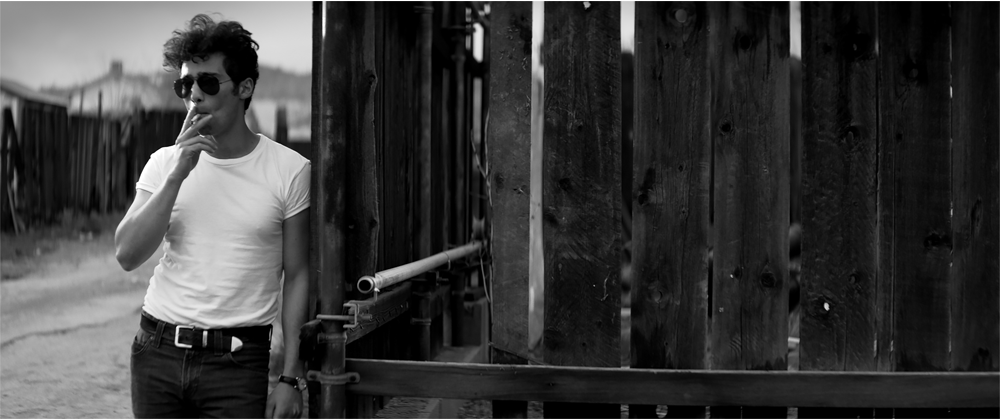
Did you pick the songs for A Girl, and were they written into the script?
Oh yes.
Do you find that this gives an advantage to you and the actors, having the songs written into the scripts for these characters?
I think that any information that’s in your head about your world and your story and the kind of event, or the feeling or the moment that you are trying to convey and create – that is my main and most important duty, to have as much information as possible. A movie is really a currency of emotion. Music is pure for me. When I think of all the different art forms, the one that gets in the core belly of my emotions, more than anything, in the most direct, lightning-laser way, is music. It’s so fucking powerful and it’s like a drug. You can lose yourself. It has a power that doesn’t go away. Some songs you can live inside for years and years, and they come and they take you instantly and transport you emotionally. The thing that’s interesting about music is that it is not at all academic. I don’t like jazz, and I’ll say that first because I feel that for me, jazz is very academic and I can’t lose myself in it. But all other kinds of music, yes. I’ll listen to blues, rock, vintage rock, techno, dance music, house music, some hip hop. But it’s gotta be really, really good classical music, like Beethoven, oh my God, I fucking listen to Beethoven and I feel like I’m time traveling. I really need to be ready if I’m going to put on Beethoven.
I get surprised at how many filmmakers I know who don’t think about the music. I really like having a predetermined idea, even if you don’t end up using that. It helps bring people together. Language and words are so weak.
It’s another form of expression, like when you can’t find the words to say something and you want to get this intangible thought across, you can say, “it’s kind of like that Tom Petty song mixed with Kurt Cobain, but only in this one verse.” And then the person you’re speaking to gets it.
Totally. I think if a song conveys the feeling of a moment in a scene, or it’s going to be in a scene, or maybe it’s the essence of a character, why wouldn’t you use it? It’s so powerful. It speaks to everybody. The other thing about music is that the cameraman is going to be affected by it, the editor is going to be affected by it; it helps you convey rhythm and tone, feeling and emotion on a next-level plane. Music is – and I am not a religious person, I don’t believe in all that stuff, but I mean, I believe that there’s some kind of weird… fucking, some shit is going on for sure, some kind of magic “It’s crazy that we’re alive” type of stuff. But if you have a certain DJ playing, or a band, or whatever, you have 500 people in a room, all different people, all different ages, all different everything, together inside the song. It’s like a religious thing, a group coming together. So yeah, I think it’s cool to harness that togetherness in a song.
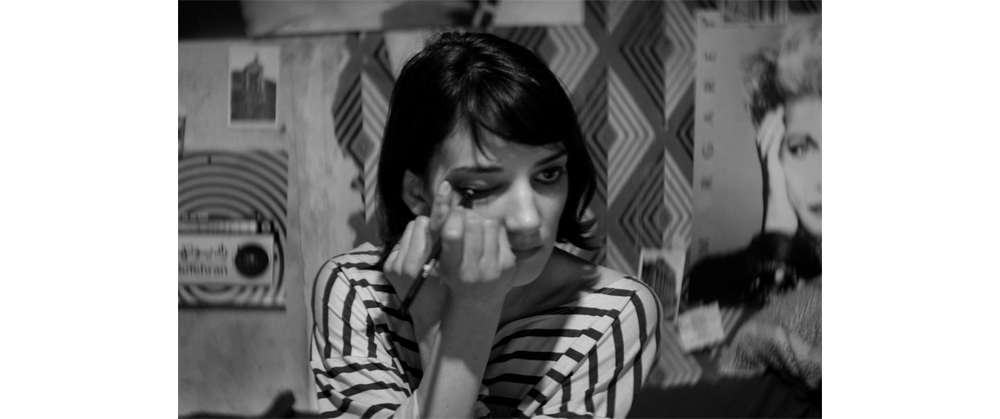
For A Girl, you listed Once Upon a Time in the West and the movie Wild at Heart as being really influential. How did those films in particular influence A Girl?
And Rumble Fish. I was referencing Rumble Fish when I made my first short film before I even knew that I was going to do A Girl as a full-length feature. I had that chador, and I put it on, and once I did I was like, “OK, this is a vampire. This is an Iranian vampire.” It was so clear. I felt like a bat, because it’s black and creates a geometric shape. I wanted to see it against white walls and I thought, “Oh I’ll just do a short film in black and white, and it’ll just be this girl in the chador, and a man will follow her home at night. Then he will track her down in some building, into a room, and she’ll kill him in the end.” The film was about five minutes long, with no dialogue, and it was called A Girl Walks Home Alone at Night. Rumble Fish was the movie I was looking at when I made that film. But then when I decided to expand the short film into this love story, Wild at Heart was one of the elements that came in.
David Lynch is one of the best things ever invented… by the universe. The universe’s best inventions: David Lynch, Bruce Lee and music. Those are probably the best things. Wild at Heart is my favorite Lynch film, and I feel like I’ll be referencing it for every film that I make. I love it. And I can’t even really fully absorb it, and I’ve seen it like, forty times probably. I watch it all the time. I’m referencing it for the new film I’m doing now. You never see the same thing twice in a Lynch film. There’s so much happening on so many levels in every moment. And that film in particular is savage and romantic – it’s his most romantic and optimistic film, too. So that’s why I really like it. And the design. In a Lynchian world it’s really like a dark fairytale; the characters are iconic and they look a certain way, they talk a certain way – it’s strange but consistent to the universe. That’s why it feels like a fairy tale, or like a dream. For me, I’m not really interested in making films to translate the real world into something that looks like the real world. To experience the real world, all I have to do is open my door and go outside. Lynch’s films are like a trip, an adventure. I love fantasy. I loved fantasy movies growing up. Like The NeverEnding Story, Superman, Back to the Future. I reference Lynch, because when you reference him to your actors, it basically means, “there are no rules,” except for the rules that are constructed for the purpose of this world we’re making. So, you kind of throw away rules. Everybody does; it applies to the editing and the performances, the acting, the costumes, everything.
I love the way Lynch uses music. And then of course, Sergio Leone. I’m very into Westerns. I actually love For a Few Dollars More. That’s my favorite Sergio Leone western. And the Man Without a Name trilogy. It’s beautiful. And I love the bad guy. He’s one of the best bad guys. I mean, Bobby Peru, from Wild at Heart is my favorite gangster of all time. But the bad guy in the Man Without a Name trilogy is good too. Sergio Leone films, with the music he chose, his style, and the small, weird, lawless town, where it’s more vigil anti-justice or no justice at all – and the tension – there’s a patient, pregnant space in all westerns, and especially in Leone’s westerns. The pregnant space is full of juicy tension, leaving you hanging and waiting and waiting. While directing A Girl, I would straight up be like, “OK, now this is your Sergio Leone, your Clint Eastwood dual stare off.”
I reference movies like crazy. I’ll be like, “Do this scene like Marty McFly just got out of the time machine in year 1954,” or “do the scene like it’s like the opening scene in Inglorious Bastards.” There’s so much in the movies. Everybody references them, and it’s so awesome to do it. Because we love movies. We love talking about movies. They stay with us. So when you get to make one, of course all of your favorite movies are part of the DNA of the stuff that’s forming inside of you.
I remember in an interview, you said that you would tell your actors, “When you’re turning your head, there’s no way you could turn slow enough. Just be as slow as you possibly can. There’s no exaggeration that is too much.”
Yes. That was for that one moment in the movie – when the two main characters in A Girl connect – when they physically come together. We practiced it in rehearsals, because it’s not natural to move slow and so affected. It’s weird. If you change the way you move, even slightly, it becomes really trance-like and hypnotic. All of the traction happens in the space between two people; it’s where all the juice is. Romantic love – and this is crazy – but I feel like romantic love is the sudden, crazy, potential energy that happens when someone you want wants you, too. Then the minute that you consummate your relationship, the energy between you dissolves. Even if it remains, it’s almost like a hair – you know how a hair stays on your skin once it’s done growing out, but it’s actually dead. That’s what romantic love is. It’s like the hair coming out of the skin and growing, and then it reaches that point when it starts to die. It is going to turn grey, it is going to fall out. To me, that’s the undeniable nature of all things that live on this earth. Romantic chemistry is a living thing too, so why wouldn’t it have the same process?
What is the history of the vampire in A Girl? Is there a backstory?
Oh, it’s like over a hundred years of backstory. That’s why I’m so happy I get to make the comic book, because the main character gets to live on, and her backstory gets to be fully utilized. Whenever I do something – any script, any story, any film – I’ll make a whole history of the characters for the actors, so we all know who the characters are and where they’ve been. With the vampire in A Girl it ended up being that her backstory dated back 187 years.
That’s another really cool thing I love about vampires. They’re the coolest mythical character because they live forever, they don’t age, they’re supernatural. They’re like historians: super smart because they’ve been observing and thinking and philosophizing for hundreds of years. They get to see it all, all the movements, all the time periods, and the music. They’re serial killers, they’re dangerous, they’re lonely and romantic. There’s also this madness that they have to deal with because they don’t die. They continue to go through the routine of things even as the world around them changes. They just have to deal with going crazy. The Girl’s backstory is all going to be in the comic book series.
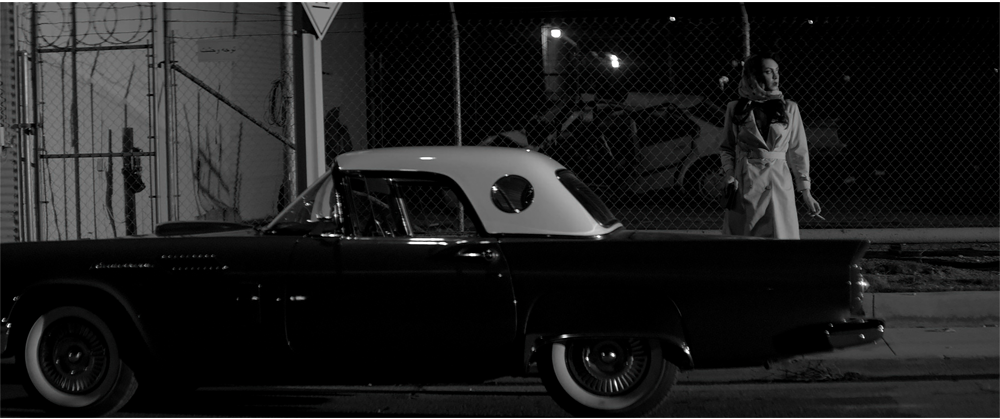
When you were in art school, what did you wish was included in the curriculum? And how can students get the most out of their time while in art school?
It’s always hard. I went to art school after living in the woods for fourteen weeks in Colorado, eating psychedelic mushrooms and way off the grid of life. I had dropped out of college and gone to snowboard in Colorado, and then when it turned to summer I went and lived with a bunch of hippies in the woods. So then my parents were like, “Is there anything you want to do? Just get out of the woods!” And I was like, “art school,” because I was always painting and drawing as a kid.
So, I went to San Francisco with my boyfriend at the time and went to art school. I think it’s one of the hardest things, to make good use of your time. One thing that is useful about art school is that it elevates your bag of tricks. I made a stop motion film a couple of years ago in Germany, and I know that the sculpture classes I took in art school made it possible for me to make the figures for the film, and that the animation classes I took in film school also helped a lot. Art school also helps you think in terms of light and color palette and tone. But, as artists, we’re really explorers. We are searching for something more than technique. So it’s really a big, next level thing. You really have to go into school searching for your true self. That just means don’t be fake about it, or try and pretend that you care about things that you don’t. I feel like a lot of artists paint or do things to please their professors, or get good at imitation, and maybe that doesn’t express how they really feel.
At times I felt really bored. I’m really good at photorealistic painting, and I was in these painting classes, making paintings that were impressing people. I realized that was why I was doing it — to impress people. There’s no soul in that. I have this really good friend, Elizabeth. We lived together in San Francisco. She does these wild, out-of-control, kinetic, abstract paintings that excited me so much. I loved her fucking paintings, but I could never paint like her. As a photorealistic painter, I just didn’t know how to paint like her. Then I started to take sculpture, and that was when I started to feel really alive. The fire and metal and welding and just cutting wood all felt primal, and I didn’t feel like I was in control. That’s another good thing to do in school: try and lose control and let your materials guide you. It’s a really good question to ask, “What do you get out of art school?” because artists in general are looking to get something bigger.
It’s like sex — you can draw a diagram of what sex is, but no two people are the same. The only way to figure out how you like to have sex is by being brave and figuring out what you like. Then you are truly vulnerable; there is nothing to hide behind. There still are times where I just didn’t say what I really wanted, or I wasn’t really enjoying something and I went along with it, and that’s wrong. You can’t do that. You’re not going to really please yourself and find out what you like by pretending to like something you don’t like. You have to pay attention to how you are changing and look for what’s keeping you awake and turned on. That goes for sex, art, and life in general.
You have to recognize how you are evolving and respond to that. You have to see how you’re changing and see how what you like has changed.
Totally. My boyfriend at that time was a musician. He was always playing and listening to music. I would just paint the painting that I had to paint for class. After I came home, I wanted to play music or go snowboarding and not paint anymore. My boyfriend was always like, “You should be painting all the time if you want to be a painter.” But, I didn’t want to be a painter, you know?
And now you’re doing what you want to do, and you’re successful at it. I think your advice is going to help a lot of students reinterpret and revitalize their own experience at SAIC. During my first year of school I also did a lot of work for the sake of the assignment.
I was like that a lot. I showed A Girl at the American Film Institute recently and talked to directing and cinematography students. When I think about when I was in film school, it’s like a John Hughes movie, where the main character tries to change himself to fit into all these different things they think they’re supposed to be, and then at the end realizes, “Just be the geek that you are and be with people who appreciate that.” It’s a double-edged sword, because you do need validation and encouragement to know there’s a use for your madness. But if you love something, you’ve gotta do the shit out of it and not give in to the despair and the deceit.
I was in France, and I got this prize and had to go up on stage and say a speech. I just went up there and was like “Yeah, you know, I’m pretty much just like a fucking madman, sitting in my house most of the time alone thinking, ‘Iranian vampire! And it’ll be a western.'” I feel like I’m like Doc Brown in fucking Back to the Future. And I’ll tell you something about Doc Brown: if the fucking DeLorean didn’t work, that dude would be in the insane asylum.
Doc Brown is what every artist is: you just need the DeLorean to work. And you know he doesn’t have a lot of friends, but he has Marty. I feel like for all the art students, there’s this weird focus on how to make art and be successful, that there’s some idea of what that is. It’s just so hard and unstable. So really, you just have to be super fucking into your ideas, really into what’s happening to you, and really into what fascinates you, what really fascinates you.
There’s a Chicago-based artist named Theater Gates who does a lot of work in impoverished neighborhoods in Chicago and revitalizes small communities by turning dilapidated buildings into community centers. Sometimes these centers function as installation pieces, or he creates sculptures that get the greater community’s interest and bring publicity to the neighborhoods. But he was speaking at the Art Institute recently, and he said, “You know, I’m in my forties, and no one has cared about anything I’ve done for the last 17 years. So when no one cares about you, when you’re doing you’re thing, and building whoever you are, do not get disheartened and remember why you’re creating. Remember why you make.” And that’s exactly what you’re saying: when the DeLorean doesn’t work, just keep going!
Yeah! Like, get it to work! If you see Doc Brown’s house at the beginning of Back to the Future, there’s a lot of inventions in there. And you know he’s making gadgets because he wants to. But the DeLorean is his fucking time machine, and he got it to work.
It’s funny because the first day at UCLA, I remember Richard Walters saying, “You’re going to have to learn how to deal with despair and feeling hopeless and feeling like it’s never going to happen.” And I remember thinking like, “Jesus, this is so grim.” But it really stuck with me when he said that. I get it. It’s hard.
Another good piece of advice I got was from Alexander Payne. He told me, “Go where the love is.” And I think it’s similar to the John Hughes analogy. There’s always some festival that you want that doesn’t want you. And then the one that wants you, you just see them as “not the one you wanted.” So whatever it is, it’s good to go where the love is.




